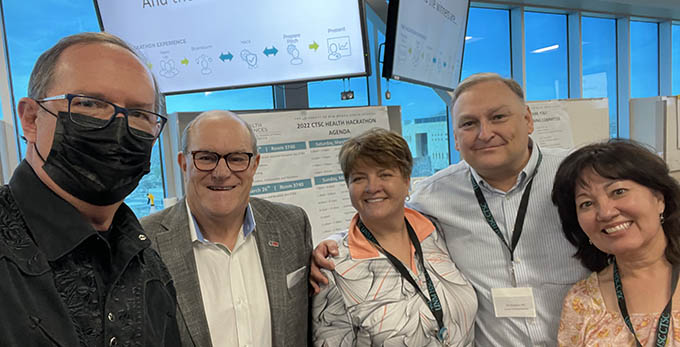They came. They saw. They hacked.
After a two-year hiatus due to the COVID-19 pandemic, The University of New Mexico Clinical & Translational Science Center (CTSC) Health Hackathon was back in person at the Domenici Center for Health Sciences Education over the weekend of March 25-27.
The Hackathon seeks to stimulate innovation in health care, encourage multi-disciplinary collaboration, and foster creativity in a fun and competitive atmosphere.
Six teams participated in the event, bringing together individuals from diverse backgrounds – including students, educators, programmers, entrepreneurs, engineers, dental hygienists and physicians – to identify pressing health care challenges and “hack” a solution in the form of innovative technology.
Participants formed teams on Friday evening around ideas presented by fellow ‘hackers.’ They spent most of Saturday analyzing the ideas and issues, brainstorming approaches, methods, and solutions, developing prototypes, business plans, and their final “Shark Tank”-style pitch presentation.
On Sunday, the teams pitched their ideas to panel of judges, competing for a chance to apply for grants from the CTSC of up to $10,000 to help bring their ideas to life.
Three teams won the opportunity to continue pursuing their idea, with concepts running the gamut from addressing crises in UNM student housing and oral health to helping medical professionals embrace equity and inclusion in their practice.
One winning idea – called NanoPOD – uses nanotechnology to prevent oral disease by introducing nanoparticles into toothpaste and mouthwash. Iron oxide nanoparticles added to these products disrupt biofilms and kill harmful bacteria.
“Oral disease is a crisis,” said team leader Jennifer Carranza, a student in the UNM dental hygiene master’s program. “Forty-seven percent of adults over the age of 30 have some form of periodontal disease, and it is preventable.”
Another winning team tackled impacts on student health resulting from the lack of accessible student housing. Homeless young people experience higher rates of chronic health problems, trauma-related injuries, and nutritional problems according to Youth.gov. The Alternative Student Housing app aims to connect students in need of housing to nearby affordable and available residences. According to the team, 41% of UNM students experience a housing crisis at some point during their time at the university.
The third winning pitch, IDEA (Inclusion, Diversity, Equity and Anti-discrimination), led by UNM surgeon Ming-Li Wang, MD, focused on creating an engaging, game-based app to help medical professionals recognize the impacts of bias and micro-aggressions on patients and help them alter their behaviors in the workplace.
Other ideas in the competition were developing an “electronic nose” to detect diseases like COVID-19, heart disease and cancer, an app to help nurture compassion in future health care providers and an app that uses machine learning to detect indicators of inflammation, which is a major consequence of obesity and contributes to cardiovascular disease and diabetes.
Teams were judged on the content, impact to health care, quality and clarity of their presentation, as well as the marketability and feasibility of the idea or technology.
The event is led and organized by the CTSC. Gold sponsors included the Health Sciences Office of Research, the UNM Office of the Vice President for Research and the School of Engineering. Silver sponsors were ASCEND HUB, UNM Rainforest Innovations, the Anderson School of Management, the College of Pharmacy and the College of Nursing.
The event was co-chaired by Eric Prossnitz, PhD, distinguished professor of Internal Medicine, and Robert G. Frank, PhD, professor in the College of Population Health. Christina Salas, PhD, an associate professor in the Department of Orthopaedics & Rehabilitation, helped to organize the event and provided 3D printing assistance for teams interested in designing prototypes of their technology.
This year’s judges were Gregg Banninger, PhD, innovation manager for life sciences at UNM Rainforest Innovations; John Chavez, MBA, managing director of the New Mexico Start-Up Factory; Trish Lopez, founder of Teeniors; Stacy Sacco, MBA, lecturer in the Anderson School of Management and director of the UNM Small Business Institute, and Mathis Shinnick, director of corporate engagement at UNM Rainforest Innovations.
